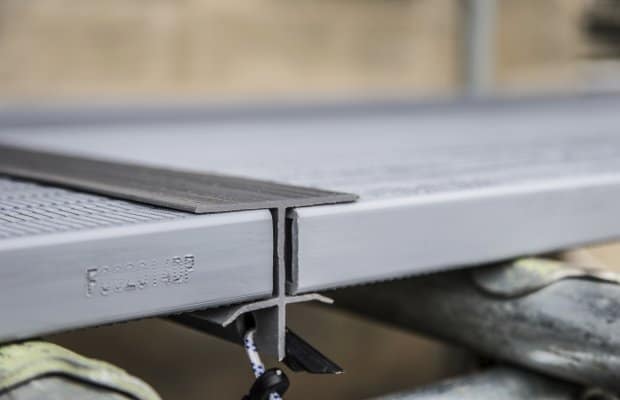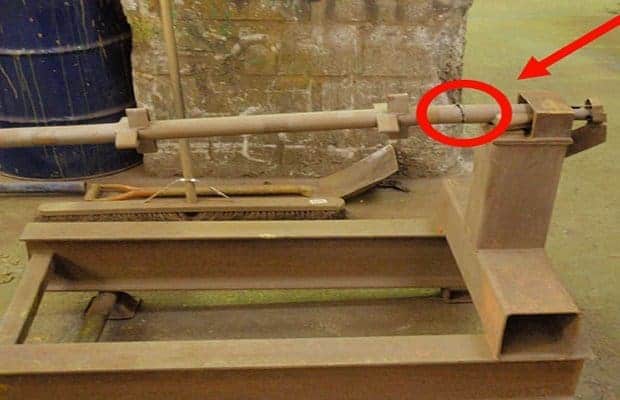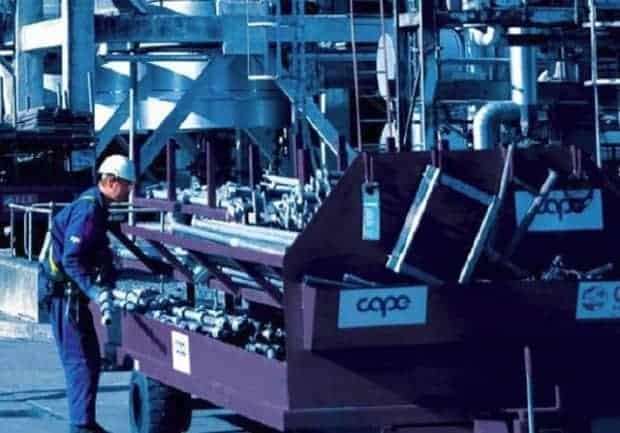A scaffolding firm and the owner of a roofing company have been fined after a worker suffered serious injuries when he plunged nine metres through a fragile warehouse roof in Northampton.
Labourer Stephen Allibon was walking on fragile asbestos cement sheeting during roofing work on 13 August 2012 when it gave way beneath him. He fell onto a metal pallet and then the concrete floor.
He sustained three fractures to his right arm, multiple fractures to his face and head, a punctured lung, damage to his chest and a severe gash to his right leg.
Mr Allibon, who is still unable to work, now has reduced movement in his right arm and right leg, numbness in his left arm, and suffers chest problems and dizzy spells. His employer, Beekay Scaffolding Ltd, and contractor William Thomas Toone, trading as Industrial Roofing Services (IRS), were both prosecuted by the Health and Safety Executive (HSE) after an investigation identified they had both failed to make sure the work was carried out safely.
Northampton Magistrates’ Court heard today (19 May) that Beekay had been contracted by IRS to erect scaffolding for a warehouse roof repair in Watford village.
Repair work to the roof was planned in two stages. Protective nets and scaffolding were put in place to the south side to allow repairs to take place there before being moved to the north side to complete the work. However, poor management meant that when Mr Allibon was moving scaffolding tubes from the south side of the roof, there was no edge protection and no netting remaining under the perimeter of the roof where he was walking, nor were the scaffolders using platforms of any kind. HSE found that both companies had agreed safety precautions in advance of the work but both had failed to ensure they were implemented properly during the course of the work, exposing the workers to extreme risk.
Beekay Scaffolding Ltd of Obelisk Rise, Kingsthorpe, Northampton, was fined £6,000 and ordered to pay costs of £2,640 after admitting two breaches of the Work at Height Regulations 2005 and a single breach of the Construction (Design and Management) Regulations 2007. William Thomas Toone, trading as Industrial Roofing Services (IRS), of The Leys, Roade, Northampton, was fined £2,500 and ordered to pay costs of £1,400 after pleading guilty to a breach of the Health and Safety at Work etc Act 1974.
Speaking after the hearing, HSE Inspector Richard Lockwood said:
“Mr Allibon suffered very serious injuries, but we could easily be talking about a fatal incident. Simple, straightforward, common sense procedures could have prevented this fall and the severe consequences it has had for one worker and his family.
“Both IRS and Beekay Scaffolding fell very far short of a safe and reasonable standard. They were clearly informed of the dangers. If properly used, the precautions would have reduced the risk to a minimal level. “The dangers of working at height are well-known in industry, yet workers still die or are permanently disabled because of the poor safety standards and lack of safeguards that still exist among some contractors.
“It is essential that the hazards associated with working at height are recognised and understood by those carrying out the work.”


 Scaffolder, Basic Scaffold Inspection and Scaffolding Supervision.
Although scaffolding training is not necessarily a new thing in this region it is only in recent times that clients and contractors are beginning to question the suitability, course content and duration of some of the previously available courses.
The introduction of the CISRS scheme is seen as a massive step forwards in improving the safety and quality of scaffolding erected on site. As such, many of the major players within the region are looking to implement a scheme which reflects UK standards.
Dave Mosley (CISRS Scheme Manager) said:
Scaffolder, Basic Scaffold Inspection and Scaffolding Supervision.
Although scaffolding training is not necessarily a new thing in this region it is only in recent times that clients and contractors are beginning to question the suitability, course content and duration of some of the previously available courses.
The introduction of the CISRS scheme is seen as a massive step forwards in improving the safety and quality of scaffolding erected on site. As such, many of the major players within the region are looking to implement a scheme which reflects UK standards.
Dave Mosley (CISRS Scheme Manager) said:








 The F-Board system includes a retaining strip which neatly and quickly locks the platform to the ledgers. This retainer can also be used in conjunction with wooden boards during the changeover to using F Board, it also ensures that one of the major trip hazards found on construction sites is eliminated, namely, the end of a scaffold board ‘tipping up’ when a weight is applied to the middle of the board.
The use of the retainer also adds security in that boards cannot easily be ‘borrowed’ from the platform to be used elsewhere on the site. Trip hazards caused by warping are eliminated, no more falls through hidden internal rot, no end bands becoming dislodged, and no splinters. The boards can easily be cut to desired length using a hand saw.
The F-Board system includes a retaining strip which neatly and quickly locks the platform to the ledgers. This retainer can also be used in conjunction with wooden boards during the changeover to using F Board, it also ensures that one of the major trip hazards found on construction sites is eliminated, namely, the end of a scaffold board ‘tipping up’ when a weight is applied to the middle of the board.
The use of the retainer also adds security in that boards cannot easily be ‘borrowed’ from the platform to be used elsewhere on the site. Trip hazards caused by warping are eliminated, no more falls through hidden internal rot, no end bands becoming dislodged, and no splinters. The boards can easily be cut to desired length using a hand saw.



